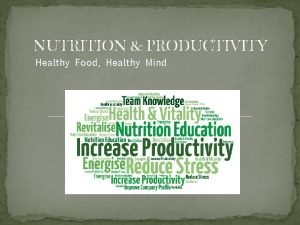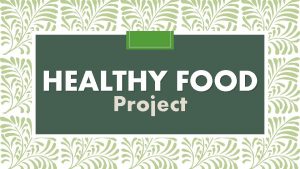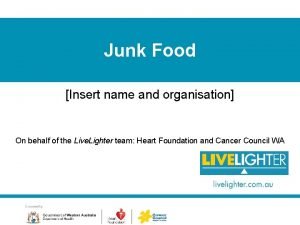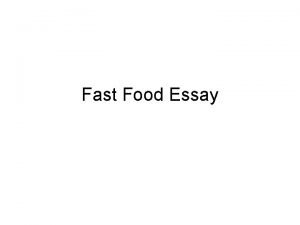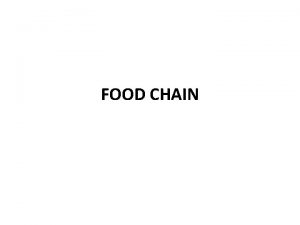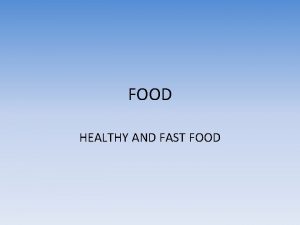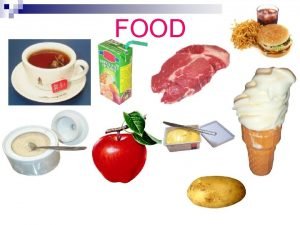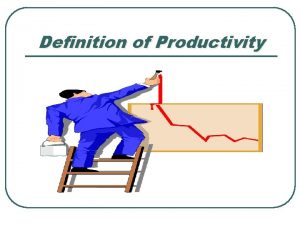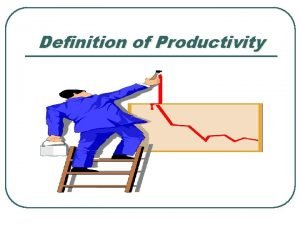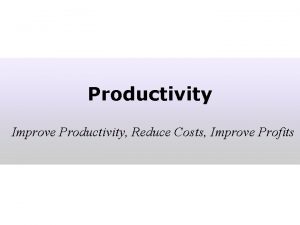NUTRITION PRODUCTIVITY Healthy Food Healthy Mind The Link









- Slides: 9

NUTRITION & PRODUCTIVITY Healthy Food, Healthy Mind

The Link Between Nutrition & Productivity An unhealthy diet does not provide you enough energy for your everyday needs. An unhealthy diet: • • • leads to fatigue causes poor mental health provokes irritability increases stress and depression decreases your energy level reduces your ability to think clearly and work effectively Healthy eating is an essential part of a healthy lifestyle, but most • people are likely to think about healthy nutrition only in connection with either weight loss or health in general. Only very If you want your brain to perform at its best, avoid few will connect eating habits with productivity at work. eating junk food. The biggest enemies of productivity Research conducted by scientists at Brigham Young University are: revealed that employees with unhealthy diets were 66% more likely to report a productivity loss than healthy eaters. The foods • Sugary foods like soda or sweets that will give we eat have a direct impact on our work performance, so if you want to increase your productivity, you should pay close you a burst of energy, but later you will suffer attention to your eating habits. from a sugar crash and feel weak, confused or anxious. � Unhealthy nutrition is linked with a 66% increased risk of loss of productivity. � Employees who rarely eat fruits, vegetables and other low-fat foods at work were 93% more likely to have a higher loss in productivity. � The drop in productivity at work costs employers two to three times more than annual healthcare expenses. � Poor nutrition brings 50% more sickness absences per year. • Calorie-ridden foods like hamburgers or fries that are full of trans and saturated fats make our digestive system work harder and reduce the level of oxygen in our brain. They will make us feel sleepy, sluggish, and decrease our work performance.

Healthy Eating: Helps reduce the level of stress--Studies have revealed that people who maintain healthy eating habits are less likely to suffer from depression or have mood disorders. When you eat healthy food, you can cope with your stress quicker and concentrate on your work better. The right foods can increase brainpower, motivation, and overall productivity by up to 20 percent, according to the � Helps you be physically and mentally active. � Energizes us and fuels our brains—Foods that contain low glycemic carbohydrates and healthy proteins and fats provide the brain with more sustained energy. You should eat fruits and vegetables, whole grains, seeds, nuts, and healthy oils to feel full of energy. People often associate nutrition with weight maintenance, but eating well is just as important for nourishing the brain. Consider increasing your intake of the following � World Health Organization. nutrients to improve brain heath and overall productivity levels: • folate, found in meat, beans, and greens • omega-3 fatty acids, found in fish, flaxseed, walnuts, and some types of eggs • vitamin C, found in berries, bell peppers, and citrus fruits • vitamin E, found in nuts and vegetable oils Also, don’t forget to drink plenty of water throughout the day. One study published in the journal Sports Medicine found that dehydration could lead to poor planning skills. While a cup of coffee in the morning is generally okay, be sure to cut back on caffeine in the afternoon and evening so your brain isn’t overstimulated at bedtime.

Consider This… � 2/3 of US adults are now overweight, and the obesity rate has increased 50% since 1960. Is this because we all just turned into junk food junkies? No, its because restaurants and food marketers are loading our meals with empty calories, and there is nothing we can do about it…but BE INFORMED! �The food industry spends $30 billion a year on advertising - 70% of that is for convenience foods, candy, soda and dessert! �Even the experts are confused. In a Cornell University study, 85 grad students and nutrition science professors served themselves ice cream. They underestimated their own serving size and caloric intake by 40%! When adopting a healthy eating lifestyle, diet is as much about quantity as it is quality.

Smart Strategies Shop the perimeter of the store when grocery shopping. • Avoid heavily processed foods. Read labels. If there’s a long list of ingredients and if you can’t pronounce the ingredients, you don’t need to be eating this food! • Fresh fruits and vegetables are always the best option. Fresh First - Frozen - Canned Make healthy food swaps when snacking and making other food choices. • dark chocolate instead of milk chocolate • yogurt and fruit instead of other unhealthy sweets • English muffin instead of bagel • water for sodas (or unsweetened tea / sweet tea cut in half) Soda tops the list when it comes to promoting obesity and related health problems. There are virtually no nutritional benefits that come with drinking sodas, so you’re practically drinking empty calories when you drink soda. Swapping sodas out for water can be one of the most powerful health changes you could possibly make. If you need some more flavor, add chopped up fruits to infuse your water, such as strawberries, raspberries and citrus. Mint is also a great addition Educate yourself about your favorite restaurants and their menus. Most restaurants have their menus and nutritional info online. Have a plan and know what you’ll order before going.

Eat a healthy breakfast. � A productive workday begins before you leave home with a nutritious breakfast. You need to start your day with your body fueled, but it’s important that you use the right kind of fuel to ensure better concentration and a steady energy level throughout the morning. Don’t fall back on a grab-and-go donut, which will hurt more than help. Instead, stick with the following food groups: � Fruits and vegetables � Whole grains � Low-fat protein � Low-fat dairy Don’t skip meals. � Skipping meals will hurt you later in the day by lowering your energy and productivity. Without a regular supply of nutritious foods throughout the day, your body will not get the vitamins, minerals, and protein that it needs. Pack your lunch and plan ahead. � To avoid the temptations of skipping meals, hitting the vending machine, or joining coworkers for unhealthy fast food, pack your lunch to ensure that you have the types of food you need. Sandwiches on whole grain breads, pitas, or wraps are a good choice, particularly when paired with spreads like hummus and fillings like tuna, sliced eggs, or lean meats like turkey or chicken. Salads pack well too if the dressing is kept separate or away from the leafy greens. Bring small containers of chopped veggies, almonds, granola bars, bananas, and apples for additional snacks during the day to keep your brain and body humming. � The choices you make at lunchtime can impact your productivity for the rest of the day. For example, choosing a high-fat, fast-food meal offers empty calories and can cause your blood glucose to skyrocket and crash. You’re more likely to experience an afternoon slump on days you get fast food versus days you pack your own nutritious lunch. � It also pays to plan ahead. Don’t decide on lunch when you go on break, and don’t select snacks in your company breakroom. Planning all meals and snacks ahead of time will provide sustained energy to get you through the day, all while helping you resist the temptation of grabbing quick processed foods.

� Foods we eat influence all aspects of our life: our physical wellbeing, mental health and work performance. You can use food to your advantage. � If you practice good nutrition based on healthy foods, it will help you stay healthy and improve your productivity in the workplace and at home. � Foods we eat can either help us focus and concentrate, or they can negatively influence our alertness and ability to perform. � Eating well has many lifelong benefits. If you don’t already eat healthfully, try making a few changes at a time. It’s unreasonable to expect a full-fledged change in eating habits overnight. Plus, making a big, sudden change in your lifestyle will decrease the likelihood that you’ll stick with it. � Gradual nutrition changes are the key to long-term success. However, you will likely notice even the smallest changes when it comes to your productivity levels.

Helpful Tools My Fitness Pal � Calorie Counter � Nutrition & Exercise Journal Fooducate � Shopping App Clean Eating Magazine � Recipes � Meal Plans � Shopping Lists

Questions? Michelle Moore Asheville Housing Authority Health & Wellness Committee 828. 239. 3539 mmoore@haca. org
